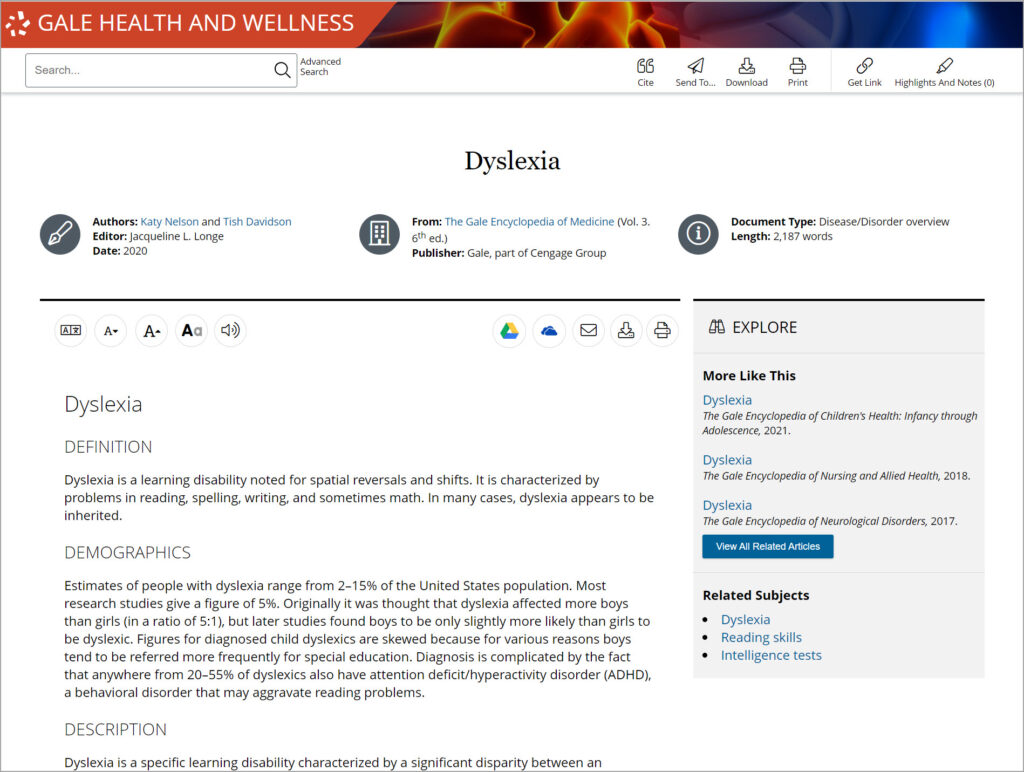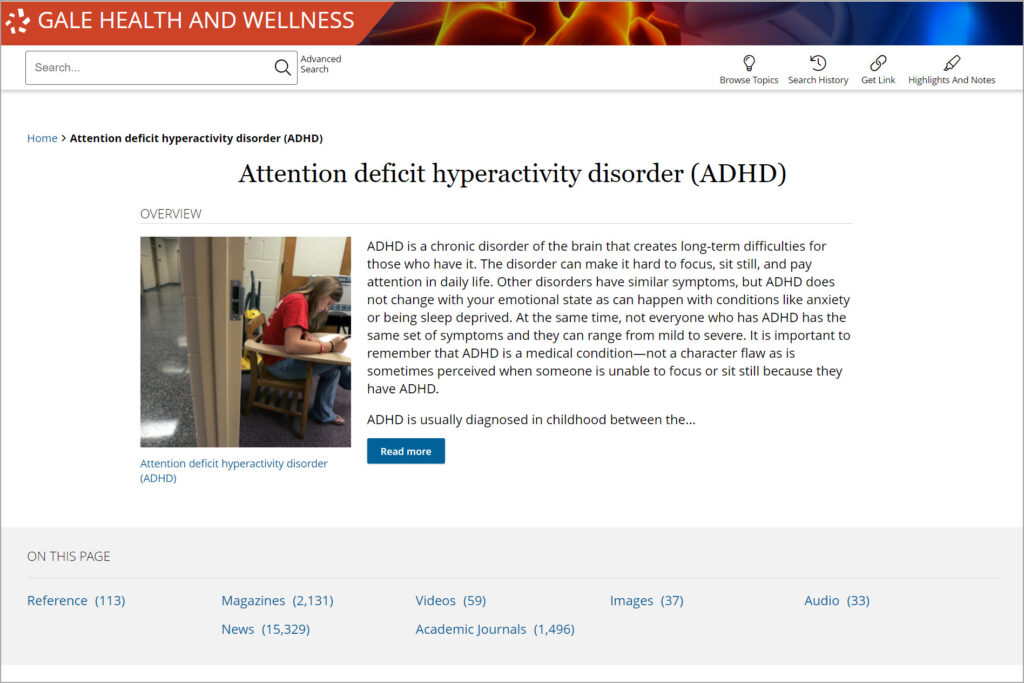| By Gale Staff |
Public libraries are the heart of our communities. They share vital information, inspire lifelong learning, provide access to social resources, and invite anyone through their doors. However, not everyone can use these assets in the same way, particularly individuals with dyslexia and other learning disabilities. For some people, reading and processing information comes naturally, yet not everyone has that privilege. Public libraries can integrate information delivery strategies and offer stigma-free support to all patrons, no matter the pace at which they learn.
While a vital theme throughout the year, October is crucial to recognize learning differences. According to the National Center for Learning Disabilities, October is Learning Disability Awareness Month, ADHD Awareness Month, and Dyslexia Awareness Month. Education data concludes that one in five American students have a learning-related disability. While patient instruction and sometimes medication can help, learning disabilities are a lifelong issue. Affected individuals may struggle academically and socially, impacting their long-term professional and personal success.
Public libraries can use their resources and community influence to raise awareness for learning disabilities. This October, share valuable information from Gale Health and Wellness to help patrons understand how learning disabilities impact children and their families. It’s a chance to reconsider how your library space supports affected individuals and commit to meaningful, more inclusive changes.
Share Reliable Information
According to the Learning Disabilities Association of America, less than half of U.S. students struggling with an attention or learning disability receive specialized instruction and support within the classroom. These underserved individuals are three times more likely to drop out of high school and less likely to complete a college degree. And state and federal inmates are twice as likely to report a cognitive disability than the general population.
Learning disabilities like ADHD and dyslexia affect a significant portion of the U.S. population. Despite the prevalence of such conditions, those affected are often undiagnosed and unsupported, potentially causing long-term consequences. For these reasons, increasing awareness is vital. Leverage Gale Health and Wellness to share reliable information about learning disabilities with your patrons.
Start your search with a general query for dyslexia. You’ll discover up-to-date summaries from vetted resources like The Gale Encyclopedia of Neurological Disorders and The Gale Encyclopedia of Medicine. Find helpful content on the definition, demographics, symptoms, and treatment recommendations. Use the interesting facts and figures you find to develop outreach resources for Dyslexia Awareness Month. Help inspire a discussion and curiosity about the disorder, and direct patrons to Gale to learn more. Our team ensures that content is accurate, unbiased, and accessible. Normalizing dyslexia and sharing its common symptoms may encourage individuals to speak up and seek help for themselves or others.

Rethink Your Library Space
Not all disabilities are physical, and individuals with learning disabilities can face barriers that others don’t even notice. Teachers adapt their classrooms to be more inclusive of diverse learners, so why not reconsider your library space as well? The library positively impacts children early on, even those who struggle with learning. Activities like story hour and picture books inspire children to read. The spark is there, but how might your current systems and structures better support those with cognitive disabilities as they grow up?
Bring attention to accessibility tools. For example, Gale databases feature text-to-speech software, so patrons easily download audio files to a personal device. Young learners can toggle content between different reading levels. Users can reformat text color, font, size, line spacing, letter spacing, and word spacing. These customizations empower individuals, as they can alter information to meet their needs without asking for assistance. Reflect on what other databases your library houses and how you might improve their accessibility.
The library environment can also be challenging for students with attention-deficit/hyperactivity disorder (ADHD). Sitting still or staying quiet is difficult for these learners. They may become disruptive or disengaged. Consider how you and your staff can respond to and adapt activities for young patrons. Have plenty of hands-on toys or fidgets in the children’s section. Keep activities brief or build in extra breaks. Speak with care, and integrate ebooks, audio stories, and visual tools alongside traditional books.

Gain a New Perspective
As a staff, seek out disability awareness training. The valuable lessons from these professional development strategies can mitigate disability discrimination. Disability awareness training can help you and your team better understand the challenges people with disabilities face. Participants communicate effectively and gain awareness of hidden disabilities, such as dyslexia, ADHD, and autism.
Invite your patrons to share their feedback. You might hear helpful insight from those who struggle with a learning disability. They may have an idea that could help improve your library accessibility that you hadn’t considered. Moreover, parents of children with learning disabilities may feel alone or even frustrated by the lack of progress in their child’s development. Share how Gale Health and Wellness content can be a reassuring tool. You could even host a support group in your library space. Help parents build community and a positive approach to their child’s learning disability.
Find Ways to Celebrate
This October, sharing Gale Health and Wellness and its many accessibility features is a significant step for recognizing Learning Disability, ADHD, and Dyslexia Awareness Months. Bringing attention to and dispelling misconceptions about these common disorders can lead to a more informed, compassionate, and inclusive library space. Consider planning other themed activities and events for your patrons throughout October.
Highlight Dyslexic Authors
Showcase a Dyslexia Awareness Month book collection at the front of your library. Many famous writers, including Agatha Christie, F. Scott Fitzgerald, Lewis Carroll, and John Irving, struggled with symptoms of dyslexia but persevered to create some of the most famous stories in the world. Their example demonstrates how learning struggles can often lead to creativity.
Invite a Guest Speaker
You might host a lunch or coffee hour event and invite a themed guest speaker. Consider a local counselor or expert who can share more information about learning disabilities, such as common signs and recommended interventions.
Develop a Resource Kit
Speak with school resource officers to create a guide to learning disability support services within your community. Feature Gale Health and Wellness, of course, but also include affordable counselors who can help diagnose struggling children, key publications, and support networks.
Learning Disability, ADHD, and Dyslexia Awareness Months may fall in October, but the lessons and changes these themes inspire can impact your library space year-round. If your public library is not a current Gale subscriber, we encourage you to contact your representative to access a trial.

